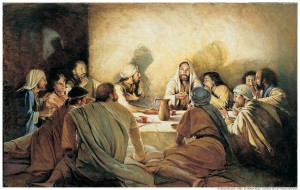Talking about Spirituality Today – Five Gospel Loves
d] Friendship and Generativity
We have looked at Gospel loves concerning God, others and oneself together with the balancing opposites – humour, leisure and self-denial. This month we turn our attention to friendship and generativity.
Friendship
Think of times we have run into an acquaintance or a friend. The end of the conversation may go something like ‘we must catch up some time’ and, mostly, nothing happens. That’s when, as a priest friend of mine said years ago, you say ‘Got your diary? Let’s set it up now.’ If, as he said, they are ‘fair dinkum’, they will – or get back soon to do so.
You’ll soon know who
your friends are…
 But it is also true how often people say ‘life is so busy we hardly have friends over or go to their place.’ Sometimes, it may be the ‘round them all up’ for an annual BBQ that does the trick.
But it is also true how often people say ‘life is so busy we hardly have friends over or go to their place.’ Sometimes, it may be the ‘round them all up’ for an annual BBQ that does the trick.
In life, and in the Christian journey, we need friends. ‘Friendship for Christians cannot be viewed as a frill that gets eliminated when time and resources shrink’ says Wilkie Au.
Look at Jesus. He seemed to have a special fondness for Peter, James and John. Think of his women friends. He was obviously very close to Martha and Mary. He wept over their brother Lazarus. Jesus, from what we see in the Gospels, had a special gift for making friends. People seem to gravitate to him.
And, of course, there were his meals with people. Sometimes it was with strangers. Often he mixed and ‘partied’ with those from the ‘lower end of town’, with ‘sinners’ – those not acceptable to the establishment. Was it just a strategy in his ministry? Perhaps…but it might have been that he just enjoyed their company. They had no airs and graces. They were what they were. In that, he found they were somehow open to him and what he had to offer.
His teaching around the meal table was more from the to- and- fro of chatting and joking, between mouthfuls of food and sips of wine. How often we find our meal has gone cold because we were caught up in a conversation. Meals provide many forms of nourishment and perhaps the food we take is incidental. 
Jesus seemed to find conversations and, at times, friendly banter the best way to say what he wanted people to hear. Perhaps more, to help them see what they needed to hear. He showed quick wit and the gift of repartee. Yet, when outwitted in his verbal sparring with the pagan Syrophoenician woman, he readily acknowledged it and granted her request for her sick daughter.
Clearly, Jesus was very at ease socially. But he also seemed to be very good company. Why so many invitations?
The spiritual journey requires close friends – one’s spouse, a spiritual companion, a long – standing pal to talk to, even to ‘dump on.’ Jesus had companions, from two Latin words - ‘cum’ (with) and ‘panis’ (bread). Companions are those we break bread with – an expression of what friends do.
In his ministry, Jesus did not go it alone. He picked a group of fellow workers – up to 72 of them we are told. Again, he sent them out in their ministry in pairs to support each other. When needed, he made sure they had ‘R and R’, as when he said ‘come apart and rest for a while.’
In the creation story, we are told that God gave Adam a companion because it was not good for him to be alone. This was not just telling us about who God is – if humans are made in the divine image. It is a reality that we should not be alone in life’s struggle.
At the Last Supper, Jesus used the love of friendship to describe the meaning of his death he was about to face. ‘[One] can have no greater love than to lay down [one’s] life for [one’s] friends. You are my friends’ (Jn. 15:13-14).
Again, the intimate knowledge and love between friends can reveal the face of God. ‘To have seen me is to have seen the Father.’ As we saw in an earlier article, Jesus knocks at the door to come and ‘share a meal, side by side with us’
(Rev. 3: 14).
Finally, he assures that He wants to call us not servants, but friends, ‘because I have made known everything I have learnt from my Father’ (Jn. 15:15). In Jesus we see that transparency between friends is both a source of revelation and of life.
Generativity
Friendship should somehow bear fruit (be generative) in other areas of life and relationships but especially in terms of the future. The psychologist Erik Erikson described generativity as ‘the concern for establishing and guiding the next generation.’ Having friends, and Jesus as a friend, must somehow benefit others.
The image of the vine and the branches captures this. Jesus invites us to ‘remain in his love’ but also to be open to ‘go out and bear fruit’ (Jn. 15: 9 & 16). It is a call to be open to new life springing from Christian friendship for the wider community, even the world.
Wilkie Au notes how a love in a healthy marriage spills over and includes the children and those outside the family. He cites Kurt Vonnegut from his book Cat’s Cradle. There, he describes this close-knit yet permeable (open-to-others) relationship as a ‘karass.’ By contrast, a ‘duprass’ is a relationship in which partners are so tightly ‘turned in on themselves’ that no one else can break in, even the children. So too with friendship.
It reminds me of a talk given by CS Lewis in Oxford in 1944 called ‘The Inner Ring.’ He was talking about ‘in – groups.’ It is the sort of thing we quickly experienced at school. We recall the small, select and readily identifiable group huddled in the school yard that no one else could join. But we later realized that sort of thing is found at work, in the neighbourhood, in the local parish, in politics and public life. It is part of life.
Lewis’s point is not that having friends or being in groups with common interests is undesirable. It is the instinct that can drive us to want to be ‘in the inner circle.’ What he is referring to is the anguish about wanting to be included, finding pleasure when we are and, then, (and this is the point) a secret delight in seeing others excluded.
In a group of people that comes together for a good purpose and to enjoy it - that’s fine and good. In such instances, exclusions are accidental. People may not join because they don’t have the skills or are just not interested.
But the ‘Inner Ring’ Lewis is describing involves a special form of ‘delicious sense of secret intimacy.’ The group defines itself and exists precisely to exclude others. Secrecy is of the essence. It is the power exercised over the others ‘not in the know.’
That’s precisely where all the fun is…
It is, when you think of it, a sort of diabolical inversion of friendship.
‘You shall know them by their fruits’…..?
Next Month: Community and Solitude
Sources:
Wilkie Au, By Way of the Heart: Toward a Holistic Christian Spirituality (Paulist, 1989).
C.S. Lewis, ‘The Inner Ring’ in Screwtape Proposes a Toast (Collins, Fontana, 1965).
Tagged as: Friendship, Generativity, Next Month
Comments are closed.


 Entries(RSS)
Entries(RSS)